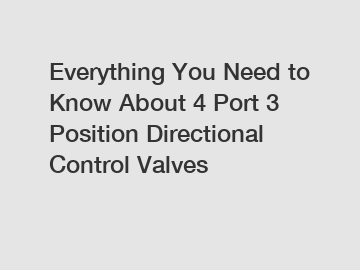Everything You Need to Know About 4 Port 3 Position Directional Control Valves
Google Hot Topics:
1. What is a 4 port 3 position directional control valve?
2. How does a 4 port 3 position directional control valve work?

3. Benefits of using a 4 port 3 position directional control valve.
4. Applications of 4 port 3 position directional control valves.
A 4 port 3 position directional control valve is a crucial component in hydraulic systems that help control the flow of hydraulic fluid. These valves play a significant role in regulating the movement of hydraulic actuators such as cylinders and motors. In this article, we will delve into everything you need to know about 4 port 3 position directional control valves.
1. What is a 4 port 3 position directional control valve?
A 4 port 3 position directional control valve is a type of valve that has four ports for hydraulic fluid to enter and exit and three positions that control the flow of fluid. These valves are commonly used in hydraulic systems to regulate the direction of movement of hydraulic actuators. They can direct the flow of hydraulic fluid to either extend, retract, or stop the movement of an actuator.
2. How does a 4 port 3 position directional control valve work?
A 4 port 3 position directional control valve works by controlling the flow of hydraulic fluid in a hydraulic system. These valves have different positions, including neutral, extend, and retract. When the valve is in the neutral position, the flow of hydraulic fluid is blocked, and the actuator stops moving. When the valve is in the extend position, the hydraulic fluid flows to extend the actuator, and when it is in the retract position, the fluid flows to retract the actuator.
3. Benefits of using a 4 port 3 position directional control valve.
There are several benefits to using a 4 port 3 position directional control valve in hydraulic systems. These valves provide precise control over the movement of hydraulic actuators, allowing for smooth and accurate operation. They also help conserve energy by only allowing the flow of hydraulic fluid when needed, reducing waste. Additionally, these valves are versatile and can be used in a wide range of applications, making them a popular choice in the industry.
4. Applications of 4 port 3 position directional control valves.
4 port 3 position directional control valves are commonly used in a variety of hydraulic systems across different industries. They are frequently used in agricultural equipment, construction machinery, and industrial automation systems. These valves are essential in controlling the movement of hydraulic actuators in applications such as lifting and lowering heavy loads, moving materials, and controlling the speed of hydraulic motors.
In conclusion, a 4 port 3 position directional control valve is a vital component in hydraulic systems that helps regulate the movement of hydraulic actuators. Understanding how these valves work and their benefits can help improve the efficiency and reliability of hydraulic systems in various applications. Whether you are in the agricultural, construction, or industrial sector, a 4 port 3 position directional control valve can provide precise control and enhance the overall performance of your hydraulic system.
The company is the world’s best wholesale pressure control check valve, Rotary Directional Valve, rotary directional valve supplier supplier. We are your one-stop shop for all needs. Our staff are highly-specialized and will help you find the product you need.
179
0
0

Comments
All Comments (0)